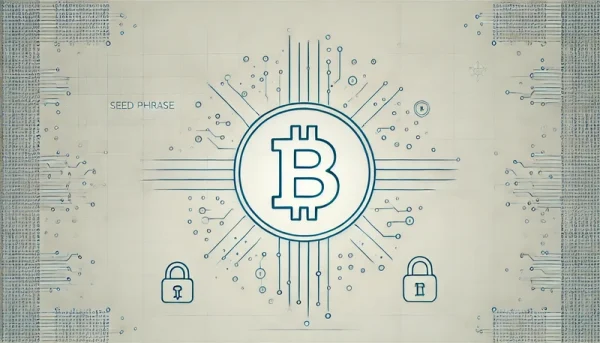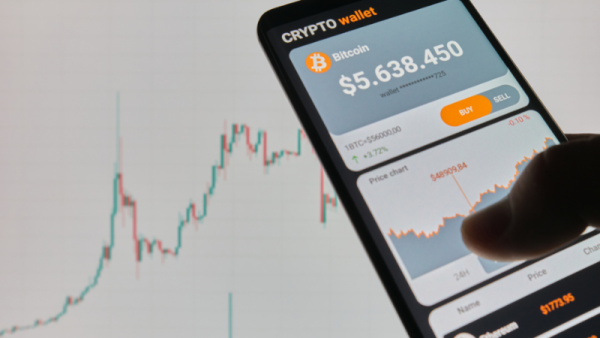The 10 Best DeFi Wallets for 2024
This article will assist you in navigating the Best Crypto DeFi wallet on the market, making the best decision, and maximizing the advantages of decentralized finance wallets.
Decentralized Finance (DeFi) is a more transparent, safe, and approachable alternative to traditional finance. It completely changes how people engage with financial institutions.
Anyone wishing to interact with decentralized platforms as DeFi grows must first select the appropriate wallet. In upcoming years, the market will be flooded with possibilities, each with unique features and advantages.
Table of content
- List of Top DeFI Wallets
- The 10 Trusted DeFi Wallets
- 1. MetaMask
- 2. Phantom Wallet
- 3. Trust Wallet
- 4. Coinbase Web3 Wallet
- 5. Crypto.com DeFi Wallet
- 6. Bybit Web3 Wallet
- 7. Bitget Wallet
- 8. OKX Web3 Wallet
- 9. Edge Wallet
- 10. Argent Wallet
- What Is a DeFi Wallet, And How Does It Work?
- What is the Difference Between Regular Crypto Wallets and DeFi Wallets?
- How to Choose the Best Crypto DeFi Wallet?
- Benefits of Using a DeFi Wallet
- How to Use a DeFi Wallet?
- Conclusion About DeFi Wallet
- FAQs about Top Decentralized Finance Wallets
List of Top DeFI Wallets
MetaMask
Phantom Wallet
Trust Wallet
Coinbase Wallet
Crypto.com DeFi Wallet
Bybit Web3 Wallet
Bitget Wallet
OKX Web3 Wallet
Edge Wallet
Argent Wallet
The 10 Trusted DeFi Wallets
Here are the top 10 DeFi wallets that make it easy to securely manage crypto assets, interact with decentralized apps, and access key DeFi features like staking, lending, and trading.
1. MetaMask
MetaMask is known for its easy-to-use mobile app and browser extension. It works with many dApps (decentralized applications) and supports many Ethereum-based coins. MetaMask's integrated swap function enables users to exchange tokens from the wallet.
Key Features
Multi-Platform Support: MetaMask is a mobile app and browser extension that allows users to access their wallets from various devices.
dApp Integration: MetaMask connects and communicates with various decentralized finance (DeFi) protocols, NFT marketplaces, and other platforms. It now supports over 17:000 Web3 dApps.
In-Wallet Token Swaps: The wallet has an integrated swap feature that lets users exchange tokens for one another right inside the wallet at competitive prices on several decentralized exchanges.
Customizable Gas prices: Users can establish their gas prices to prioritize transaction speed or cost.
Multi-Chain Support: MetaMask is flexible for multi-chain users, supporting Ethereum and Binance Smart Chain, Polygon, and other EVM-compatible networks.
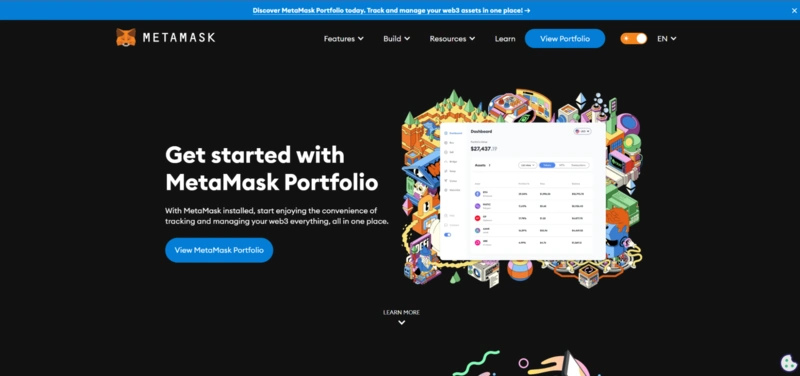
2. Phantom Wallet
Phantom Wallet is a decentralized wallet mainly made for the Solana blockchain. It has become trendy because of its strong security measures, smooth integration with Solana dApps, and ease of usage.
Phantom enables users to transmit, receive, exchange, and store tokens on the Solana network. It's also compatible with Solana-based NFTs and memecoins which makes it the preferred wallet for crypto degens.
Key Features
User-Friendly Interface: Phantom has a simple, straightforward interface that is easy for novice and expert users.
Integrated dApp Browser: Users can engage with decentralized apps (dApps) from the wallet based on Solana.
In-Wallet Swaps: Phantom enables users to exchange tokens inside the wallet, eliminating the need for outside exchanges.
NFT Support: Solana-based NFTs are fully supported by the wallet, which presents them in an eye-catching way.
Security: Phantom uses strong security measures, such as passphrase protection and encryption. For further security, integration with Ledger is also possible.
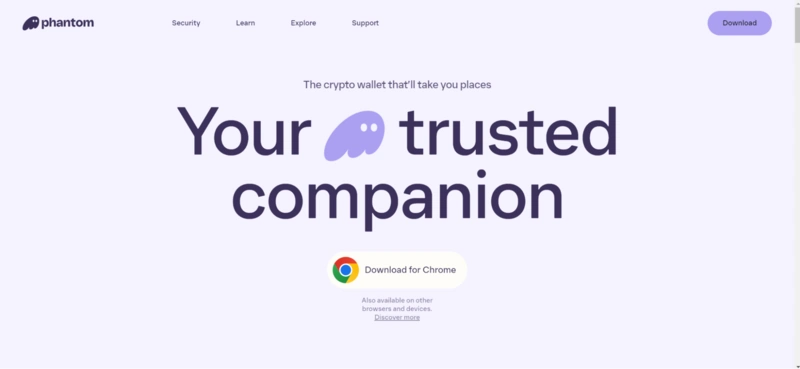
3. Trust Wallet
Trust Wallet is a highly secure, non-custodial wallet that supports many cryptocurrencies and blockchain networks. It is designed to give users an easy and accessible way to manage their digital money, interact with decentralized applications (dApps), and participate in DeFi activities directly from their mobile devices.
Trust Wallet also includes built-in staking, token swaps, and NFT management, making it a perfect tool for all crypto needs.
Key Features
Multi-currency and multi-chain support: Compatible with a wide range of cryptocurrencies across 80 blockchains.
Built-in staking and token swaps: Allows users to earn rewards and swap tokens directly within the app.
Decentralized app browser: Enables users to access and interact with various dApps and DeFi protocols.
Non-custodial: Users retain complete control over their private keys and funds, enhancing security.
User-friendly interface: Simple and intuitive design suitable for both beginners and experienced users.
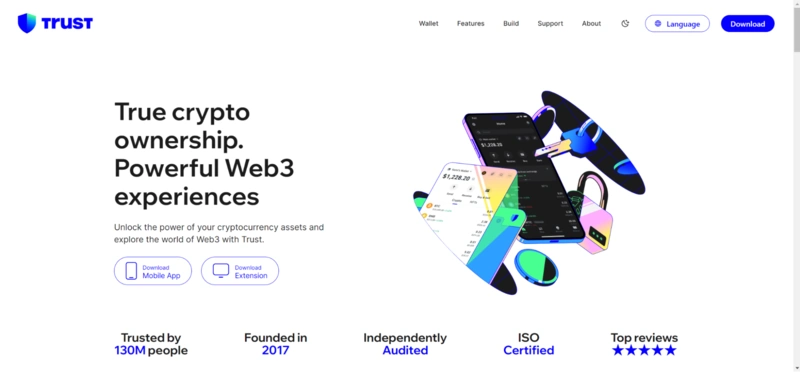
4. Coinbase Web3 Wallet
Coinbase‘s non-custodial Web3 Wallet is made to make interacting with Ethereum and decentralized applications simple. Users can trade NFTs, investigate DeFi, and manage their cryptocurrency holdings with complete control over their private keys.
Transferring funds across platforms is simple because of the wallet's close integration with Coinbase's ecosystem.
Key Features
Multi-currency support: Supports many cryptocurrencies, including Ethereum, Bitcoin, and ERC-20 tokens.
Built-in DeFi and dApp access: Users can easily interact with DeFi platforms, dApps, and decentralized exchanges (DEXs).
Non-custodial: Users have complete control over their private keys, ensuring the security of their money.
Token swaps and staking: Enables users to swap tokens and participate in staking directly from the wallet.
Integration with the Coinbase ecosystem: Provides a bridge between decentralized finance and the Coinbase exchange for a seamless experience.
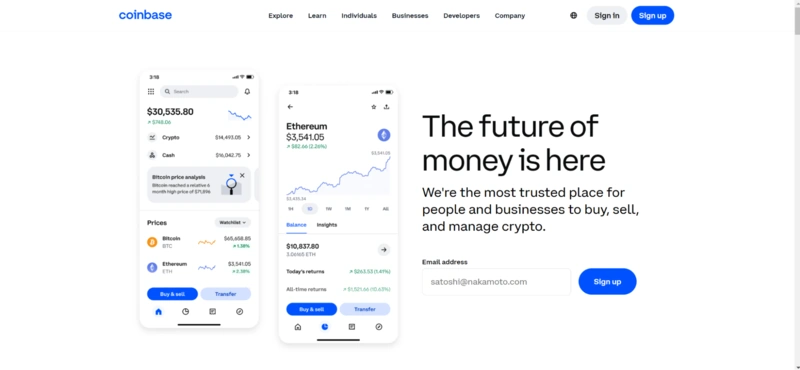
5. Crypto.com DeFi Wallet
Crypto.com DeFi Wallet offers a non-custodial solution for users looking to interact with various DeFi protocols. It supports multiple cryptocurrencies and provides features like staking, in-app token swaps, and NFT storage.
The wallet is part of the broader Crypto.com ecosystem, which includes an exchange, Visa cards, and other financial services.
Key Features
Multi-currency and multi-chain support: Allows users to manage a diverse range of cryptocurrencies across 36 different blockchain networks.
Direct access to DeFi services: Includes staking, yield farming, and in-app token swaps for easy interaction with DeFi platforms.
Integration with the Crypto.com ecosystem: Seamlessly connects with Crypto.com’s exchange, Visa cards, and other financial products.
Non-custodial: Users maintain full control over their private keys, enhancing security and ownership of their cryptocurrencies.
NFT storage and management: Supports the secure storage and easy management of NFTs directly within the wallet.
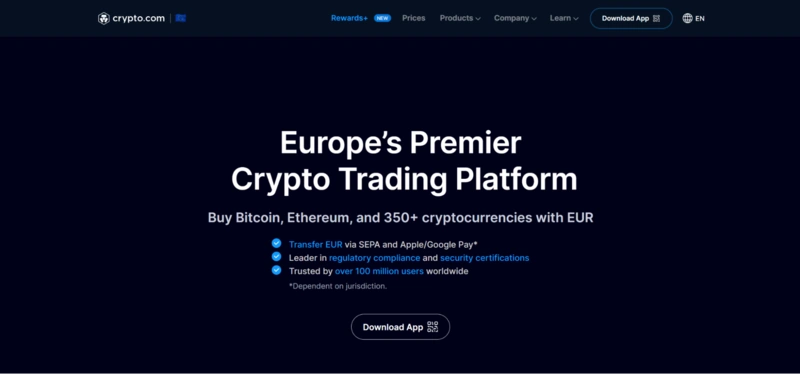
6. Bybit Web3 Wallet
Bybit Web3 Wallet offers a non-custodial solution designed for users looking to explore the world of decentralized finance. This wallet supports multiple blockchain networks, allowing users to manage various cryptocurrencies.
Bybit Web3 Wallet is integrated within the Bybit ecosystem, enabling seamless access to DeFi protocols, token swaps, and NFT management directly from the wallet interface.
Key Features
Multi-chain support: Enables users to interact with 20+ blockchains and DeFi protocols.
Integrated DeFi services: Provides direct access to DeFi platforms, including staking, yield farming, and token swaps.
User-friendly interface: It is designed to be intuitive and easy to navigate, even for those new to DeFi.
Non-custodial: Users maintain complete control over their private keys.
Part of the Bybit ecosystem: Offers smooth integration with Bybit’s exchange and other financial services.
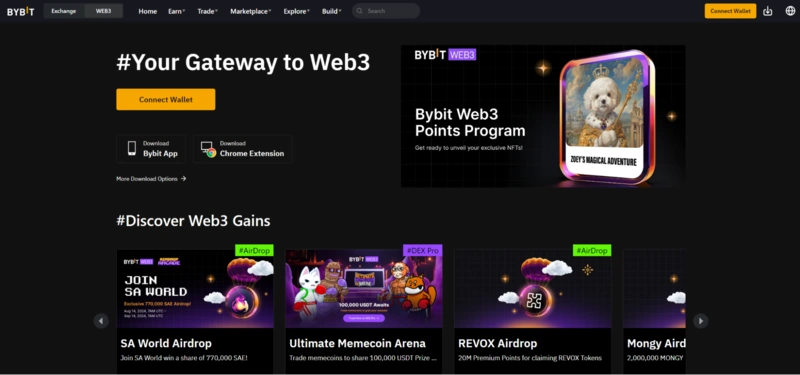
7. Bitget Wallet
Bitget Wallet is a non-custodial wallet designed to provide users with secure and seamless access to a wide range of DeFi protocols and blockchain networks. It supports multiple cryptocurrencies and offers features like in-app token swaps, staking, and NFT management.
As part of the Bitget ecosystem, this wallet integrates smoothly with the exchange, offering users a unified experience for managing digital money while ensuring full control over their private keys.
Key Features
Multi-currency and multi-chain support: Compatible with a variety of cryptocurrencies across 100+ blockchain networks.
Integrated DeFi services: Provides direct access to staking, token swaps, and other DeFi activities.
Non-custodia: Users retain complete control over their private keys, ensuring the security and ownership of their crypto tokens.
User-friendly interface: Designed to be accessible and easy to navigate, catering to beginners and experienced users.
Integration with Bitget ecosystem: Offers seamless connectivity with Bitget’s exchange and other services for a cohesive user experience.
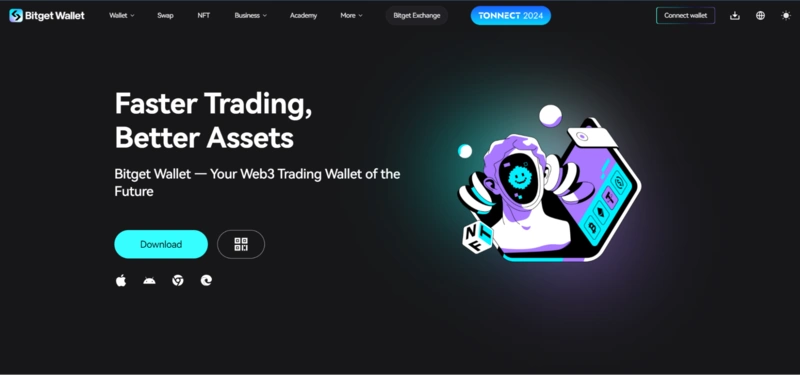
8. OKX Web3 Wallet
OKX Web3 Wallet is a non-custodial wallet designed for users who want to interact with decentralized applications (dApps) and DeFi protocols across multiple blockchain networks. It supports many cryptocurrencies and offers advanced features like staking, token swaps, and NFT management.
As part of the OKX ecosystem, the wallet provides seamless integration with OKX’s exchange and other services, giving users an ideal and secure platform for managing their digital money.
Key Features
Multi-chain support: Allows users to interact with 100 blockchains and manage a diverse portfolio of cryptocurrencies.
Built-in DeFi access: Facilitates direct engagement with staking, token swaps, and other DeFi activities.
Non-custodial: Users maintain complete control over their private keys.
NFT support: Enables the secure storage and management of NFTs within the wallet.
Integration with OKX ecosystem: Seamlessly connects with OKX’s exchange and other financial products to provide a unified user experience.
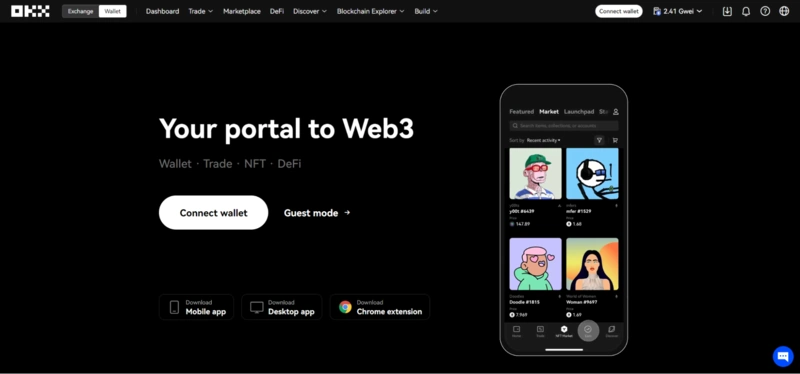
9. Edge Wallet
Edge Wallet is a non-custodial, multi-currency wallet that emphasizes security and privacy while allowing users to manage various cryptocurrencies. Known for its easy-to-use interface, Edge Wallet provides seamless access to decentralized applications (dApps) and DeFi services, including in-app exchanges and staking.
The wallet is designed to be user-friendly, with solid security features like client-side encryption and two-factor authentication, ensuring users have complete control over their private keys.
Key Features
Multi-currency support: Supports a 130+ cryptocurrencies, allowing for diverse token management.
Built-in exchange: Facilitates easy in-app token swaps and access to DeFi services.
Strong security protocols: Features client-side encryption, two-factor authentication, and non-custodial private key management.
User-friendly interface: Designed for ease of use, making it accessible to both beginners and experienced users.
Privacy-focused: Prioritizes user privacy by not requiring personal information or account creation to use the wallet.
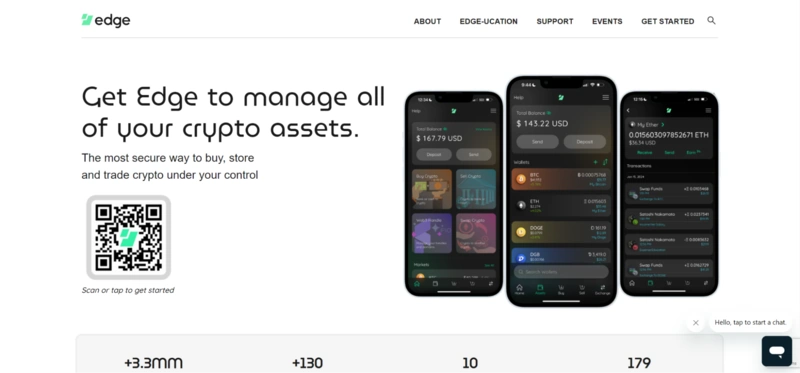
10. Argent Wallet
Argent Wallet is an intelligent, non-custodial Ethereum wallet focusing on simplicity, security, and seamless access to decentralized finance (DeFi) applications. It offers unique features like social recovery, which allows users to recover their wallet without needing a seed phrase, and built-in DeFi integrations for lending, borrowing, and staking.
Argent is designed to provide a user-friendly experience while ensuring top-notch security, making it an ideal choice for those exploring the Ethereum ecosystem.
Key Features
Smart contract wallet: It uses smart contracts to enhance security and provide advanced features like social recovery.
Built-in DeFi integrations: Direct access to DeFi services, including staking, lending, and borrowing, is available within the wallet.
Social recovery: Allows wallet recovery without needing a seed phrase by designating trusted contacts.
Non-custodial: Users retain full control over their private keys, ensuring the security and ownership of their tokens.
User-friendly design: Simplifies the experience of interacting with Ethereum and DeFi, making it accessible for all users.
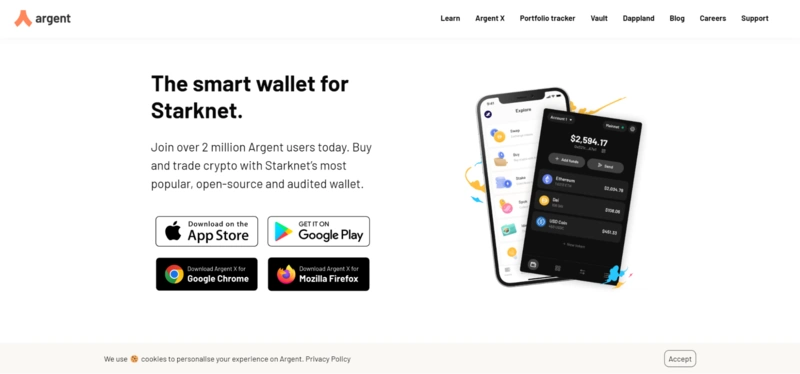
What Is a DeFi Wallet, And How Does It Work?
A DeFi (Decentralized Finance) wallet is a cryptocurrency wallet that allows users to store, manage, and interact with their cryptocurrencies decentralized.
With a DeFi wallet, you may connect with decentralized apps (dApps) on the blockchain directly while storing, managing, and trading your cryptocurrency holdings. DeFi wallets, in contrast to conventional wallets, offer exclusive control over your private keys, guaranteeing nobody else can access your money.
What is the Difference Between Regular Crypto Wallets and DeFi Wallets?
Control and security: Regular wallets, usually custodial and provided by exchanges, manage private keys for users, offering convenience but requiring trust in the exchange. DeFi wallets are non-custodial, giving users complete control over their private keys or seed phrases and funds, which enhances security but requires users to manage their keys themselves.
Functionality: Regular wallets focus on basic tasks like storing and transferring cryptocurrencies, often with limited DeFi interactions. DeFi wallets, however, are built for direct interaction with decentralized finance platforms, enabling activities like staking, lending, and using dApps.
Privacy: Regular wallets often require identity verification, linking transactions to personal information. In contrast, DeFi wallets typically don't require such verification, allowing for greater privacy and anonymity in financial transactions.
How to Choose the Best Crypto DeFi Wallet?
To handle your cryptocurrency safely and access DeFi services, you must choose the best decentralized wallet for you.
Security: Look for solid security features, including multi-signature support, biometric authentication, and hardware wallet compatibility. Always use Two-Factor Authentication, never give your private keys to anyone, and avoid unpopular wallets.
User Experience: The interface should be user-friendly, especially if you’re new to DeFi. A well-designed wallet can simplify complex transactions and make managing your cryptocurrencies easier. You can try using more complex wallets for more advanced users because they will have more functions that would benefit your crypto trading. Make sure the charts are from TradingView.
Compatibility: Ensure the wallet supports a wide range of cryptocurrencies and blockchains and can interact with various dApps and DeFi protocols. Make sure the wallet supports cryptocurrencies you are interested in and offers options and functions you are looking forward to using.
Benefits of Using a DeFi Wallet
Full Control: With a DeFi wallet, you hold the private keys, giving you complete control over your tokens. Never give your private keys to anyone.
Access to DeFi Service: DeFi wallets open the door to decentralized exchanges, lending platforms, and yield farming.
Enhanced Privacy: DeFi wallets don’t require personal information, offering greater privacy than centralized platforms.
Global Accessibility: Anyone with an internet connection can use a DeFi wallet, breaking down barriers to financial services.
How to Use a DeFi Wallet?
- Download and Install
Choose your preferred wallet from the app store or official website.
- Set Up and Secure
Follow the setup instructions, including backing up your seed phrase. Store this phrase securely, as it is vital for recovering your wallet.
- Fund Your Wallet
Transfer cryptocurrency into your wallet from an exchange or another wallet.
- Interact with DeFi
Connect your wallet to various dApps, participate in staking, lending, or trading directly from the wallet.
- Monitor and Manage
Regularly check your portfolio, monitor transactions, and update your wallet software to maintain security.
Conclusion About DeFi Wallet
These were some of the best DeFi wallets in 2024. But remember that the ideal wallet is the one that works for you.
While specific DeFi wallets, like the Bybit Web3 Wallet, are more complicated and offer more options for experienced users, other wallets, like Phantom Wallet, are better suited for beginners.
FAQs about Top Decentralized Finance Wallets
Is there a future for DeFi?
Yes, there is a bright future for DeFi as it continues to grow in popularity and innovation.
Which wallet is best for DeFi?
The best wallet for DeFi depends on individual needs. For advanced users, we recommend using Bybit Web3 Wallet or Metamask, and for new ones, Phantom Wallet or Trust Wallet.
Which blockchain is best for DeFi?
Ethereum and Solana are currently the best blockchains for DeFi due to their large ecosystems, large developer community, and widespread adoption.
What are the risks of a DeFi wallet?
The risks of DeFi wallets include loss of private keys, smart contract vulnerabilities, phishing and scams.
How do I keep my DeFi wallet safe?
To keep your DeFi wallet safe, securely store your private keys offline, use a strong password and enable two-factor authentication.
Can you make money on a DeFi wallet?
You can make money on DeFi wallets through staking, lending, yield farming, and participating in decentralized exchanges.
